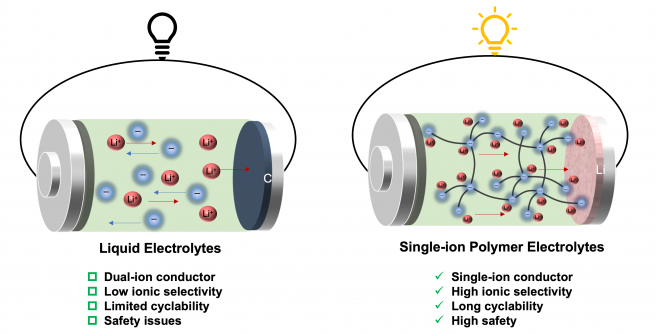With the demand for clean energy and the challenge of climate change, there has been growing distresses about battery production with a higher capacity and high-level safety, which is significant for supporting the uninterrupted growth of grid energy storage systems and electric vehicles.
 Graphs showing the ordinary liquid electrolyte lithium-ion battery (left) and the single-ion conducting polymer electrolyte designed by the research team (right). Image Credits: The University of Hong Kong
Graphs showing the ordinary liquid electrolyte lithium-ion battery (left) and the single-ion conducting polymer electrolyte designed by the research team (right). Image Credits: The University of Hong Kong
A research team headed by Dr. Dong-Myeong Shin from the Department of Mechanical Engineering at the University of Hong Kong (HKU) makes way for a feasible solution by developing a new generation of lithium-ion batteries. The team has found a series of anionic network solid electrolytes that could make an essential part of the new battery, which is more secure, has a longer lifespan, and is higher in power density.
In Chemical Engineering Journal, the results have been published.
Having advanced energy storage technology, lithium-ion batteries are the most commonly used batteries. At present, commercial battery technology primarily features carbonaceous anodes and liquid electrolytes, which come with the limitations of limited lifespan, safety issues, and inadequate power density.
To conduct electricity, lithium cations and counter anions move in opposite directions in liquid electrolytes. Generally, anions move a minimum of four times quicker than lithium cations, and hence lithium cation movement add up to only a small part (20%) of the complete ionic current. Excessive anions, on the other hand, store up at the interface between electrolyte and electrode, which leads to fading of battery capacity and internal short circuits.
Liquid electrolytes’ instability in terms of lithium metal, flammability, and low ion selectivity for conduction motivates research toward solid electrolytes. They are compatible with the lithium metal anode and could offer suitable levels of safety, exhibiting the highest theoretical specific power capacity.
In cationic transport, the single-ion conducting polymer electrolytes developed by the team led by Dr. Shin discovered a remarkable increase (minimum 4-fold). The anionic network polymers developed by the team contains borate anions bridged by branched ethylene glycol linkers of various stoichiometric ratios, where the anions are tethered into the polymer frame, facilitating a highly selective cation transport.
The conductivity of cation within the polymer was regulated by systematic engineering of segmental mobility, which helps to map out the comprehensive design rules for a new class of highly conductive solid electrolytes.
A new design rule for ion-selective electrolytes is forecasted to enable expediting the rechargeable Li-metal batteries’ realization because the single-ion conducting polymer electrolytes efficiently win over the stubborn problems of existing solid electrolytes in battery cells, like high over-potential and low cyclability.
We believe the single-ion conducting polymer electrolytes would open up the possibility of new battery chemistries that will revolutionise the field of rechargeable batteries, and offer a high level of safety, high power density, and long life cycle.
Jingyi Gao, Study First Author and Ph.D. Student, Department of Mechanical Engineering, University of Hong Kong
Dr. Shin says that due to low over-potential, the ion-selective electrolytes in batteries can also lead to fast charging. “It can allow electric vehicles to be fully charged in just the time needed for drinking a cup of coffee. This remarkable advantage will unlock a new era of a clean energy world,” he concludes.
Journal Reference:
Gao, J., et al. (2023) Engineered networking in a family of solvent-free single-ion conducting borate network polymer electrolytes for Li-metal battery applications. Chemical Engineering Journal. doi.org/10.1016/j.cej.2022.138407.